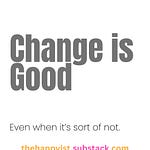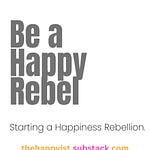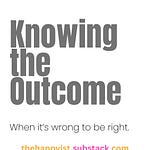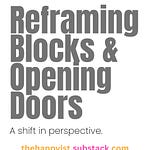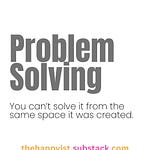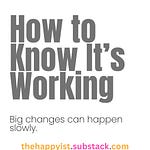Hi, I’m Sandra. Welcome to The Happyist. Here we get unstuck through appreciation and holistic happiness. Best part? It’s easy and kind of fun.
In case you didn’t notice, we’ve moved. Posts will now go out each week on Wednesdays at 6:30AM Pacific Time. And to celebrate what I feel is the full launch of The Happyist, you can get a forever discount on subscriptions if you upgrade before September 30th. This forever discount is a one-time offer, so if you’re considering a paid sub, now’s the time to strike the deal.
If you’re here, you’re likely an introspective person. You’re doing work on yourself. There are things you want to change, improve, let go of. You want to be a better you. And that’s very commendable. It really is. Not everybody looks inward. Not everyone takes responsibility for who they are. Not everyone wants to address issues. It takes a lot of courage, curiosity and hard work. Well done, you and you and you!
But there may come a point when we’ve done all the work — or at least a helluva lot of it. We have a good mindset. We are accountable. We are present. And we are stuck.
Why?
I say this with the utmost respect, honor and compassion: We can find ourselves stuck when we overly identify with our trauma. And we do that because our trauma shapes us. How can it not? And getting a handle on our trauma — owning it — is empowering. Spending time in that empowerment is healing. There comes a time, though, when we need to decide if that trauma, that experience, is going to continue to define us, or if we can move on to another version of ourselves.
And let me assert a few things: First, there are all sorts of trauma. There is capital T, lowercase T, and all caps, in bold and double underlined. And there is every shade in between. Everyone reacts to their trauma differently. I’m not lumping all trauma into one bucket, or all people affected by trauma responding in the same way. This is not one-size-fits-all.
Second, this decision to move on from being defined by trauma comes after a fair amount of time. This doesn’t just happen after the trauma is identified and addressed. No. There’s a lot of work to do from there. A lot of time and compassion to invest.
Third, we don’t suppress or ignore emotions or issues here. At all. Ever. And when dealing with trauma, we can get to a point where we think, Oh! I’ve healed and integrated. I’m all better! And something will come along and poke a tender spot just to let us know that the trauma is still there. It may be smaller, it might be easier to manage, but there. So this isn’t anything to rush or expect, and it certainly isn’t about ignoring or suppressing. Capice? Bene. Grazie.
So, after we’ve done the work, and we’ve spent the time with our wounds to the point where we understand them deeply, and we feel a lot of integration, we might come to a place where we aren’t moving forward anymore. We aren’t moving back, but we are feeling stagnant. Unable to get ahead like we used to or expect. Does anyone identify with that feeling? It’s frustrating. Because we are doing the work, we have a strong and purposeful mindset, we are doing good…and we are stuck.
When you find yourself there, ask if you might be stranded in your story. That can sound harsh and it’s not meant to. Hear me out.
For a long time, it wouldn’t take much time for you know that I come from a verbally and an emotionally abusive home. And that abuse did harm. For a long time, I identified with that harm. Not a person who was harmed, but the harm. Do you see where I’m splitting that hair? I dragged that harm around with me, and would introduce it to people at parties. It was part of who I was. A big part. And how could it not be?
There’s a benefit of talking about our experience. It can be very healing. It helps us move through the trauma, shed any shame, get an understanding of it, see that other people have had similar experiences and we are not alone in that regard. Besides, it feels good to talk about it. There’s a release. We can feel that weight lift off us. That’s catharsis.
Or the talking about it can become a habit. Our experience becomes a badge we wear. And there isn’t the release there once was. So we talk about it more, identify with it more and don’t feel that weight lifting off us anymore. It’s confusing, isn’t it? That’s cyclical.
Catharsis gives release and relief. Cyclical keeps us going round and round, and staying stuck. We can’t move forward. We are in a loop.
This is when we may need to look at what we’re doing and why. And it may be as simple and direct as changing our story.
Listen to this episode with a 7-day free trial
Subscribe to The Happyist to listen to this post and get 7 days of free access to the full post archives.





